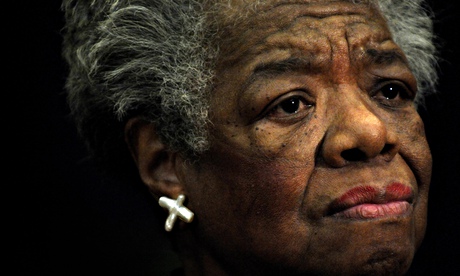
Frankly, the memory of I Know Why the Caged Bird Sings finding its way into my hands is as lost as the well-thumbed paperback itself, but I can still see its cover clearly. The dark green spine with the bitten apple that indicated it was a Virago publication. The young African-American girl wearing what looked like a nightie, walking past a small house while reading a book. The picture’s background was pale beige, its colours muddy, except for the strange, beautiful name Maya Angelou, spelt out in sloping, purple letters. I thought it uninspiring for a book, but the name drew me, Maya Angelou. This was Scotland in the early 1980s. The names of the people around us were hard-edged and familiar. This author had music in her name.
I Know Why the Caged Bird Sings is the first of several volumes of autobiography. Three-year-old Maya’s parents decide to “put an end to their calamitous marriage”, and so she and her four-year-old brother Bailey are sent to stay with their grandmother (soon known as Momma) in the town of Stamps, Arkansas, where “segregation was so complete most black children didn’t really, absolutely know what whites looked like”. Momma runs a general store. Her customers are cotton pickers and young Maya witnesses the relentless hardship of their daily lives.
At the age of eight Maya returns to her mother’s home in California where she is raped by her mother’s lover, Mr Freeman. His subsequent murder, for which the child mistakenly feels responsible, robs Maya of her voice. She knows, and is afraid of, the power of words.
Already in love with the poets James Weldon Johnson, Countee Cullen, Edgar Allan Poe and Shakespeare, Maya regains her voice after a neighbour she admires tells her “words mean more than what is set down on paper”. She convinces Maya that she cannot truly love poetry until she can speak it out loud. The book ends with Maya living in San Francisco, where she graduates from high school and becomes an unmarried mother at the age of 16.
Written boldly, this sequence of events might see I Know Why the Caged Bird Sings consigned to the “difficult lives” section of bookshops, but this is not a misery memoir. The book explores African American history through the portrayal of one young woman’s life. It demonstrates the iniquities wrought by slavery, racism and institutionalised violence and shows that learning, music and poetry have the potential to offer not merely escapism, but a bridge towards dignity in the most undignified of situations.
Angelou is no apologist. Like the abolitionist Frederick Douglass she is incensed by suggestions that slaves and cotton pickers sing because they are happy. One of the potentials Angelou identifies in the arts is the ability to propel individuals beyond their own existence. Angelou perceives poetry in particular as having the power to enable us to recognise and know each other, as she finds in Shakespeare’s Sonnet 29 (When, in disgrace with fortune and men’s eyes). In later years she would describe Shakespeare as “a black girl”.
I was not sophisticated enough a reader to articulate much of this on my first reading, but the integrity of Angelou’s vision helped me to experience the power of words and writing. It may seem presumptuous, but there were moments when I met myself, a white, bookish Scot, in the life of the young, bookish Angelou. Her ability to involve me in an existence so different from my own was largely due to her writing style.
I Know Why the Caged Bird Sings is written from life, but uses some conventions of fiction. The people in young Maya’s world are brilliantly characterised, we hear them talk and feel their joys, fears and humiliations. When Momma retains her dignity despite being insulted outside her store by a group of young white girls, I felt Maya’s triumph. The need for self-respect is one of several themes running through the book.
Rejected by her parents and society at large, Angelou is an outsider, something most teenagers, even those in comfortable circumstances, consider themselves. The book is punctuated by references to her ugliness, another feeling I related to. (I felt a little betrayed to discover she was beautiful.) Finally, the paperback itself was testament to the fact that, despite the odds, she had become a writer. If Angelou, born in a country that was hostile to her very existence, had managed to become a published writer, might there be a sliver of a chance that I could too?
Angelou was the first author I plucked up the courage to see at the Edinburgh international book festival. She was there and she existed, inside and outside of me, her voice reading her words. I thought my mind might explode.
She helped me to better understand the black American experience. Her words continue to resonate. Forty-six years after the publication of her memoir, African Americans are twice as likely to be shot by police as their white peers. Reading of the deaths of Michael Brown, Eric Garner, Walter Scott, and Freddie Gray takes me back to Angelou’s line: “The black woman in the south who raises sons, grandsons and nephews had her heartstrings tied to a hanging noose.”

